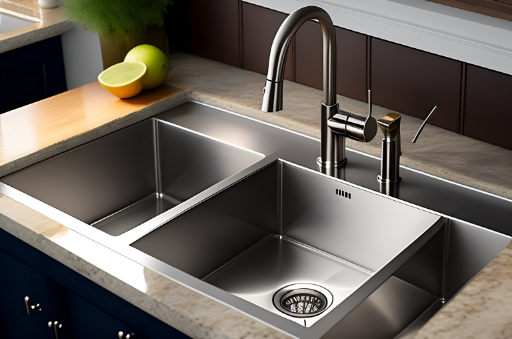
Stainless steel fixtures are both attractive and durable. The term “stainless” is actually misleading, as anyone who has had a “stainless steel stain” can attest. The more accurate phrase is “corrosion resistant,” because stainless steel contains high amounts of chromium, which prevents corrosion. Want to learn how to clean and care for your stainless steel fixtures and sinks?
Indeed stainless steel fixtures can stain and rust. But that can easily be prevented by proper care. Here are some tips:
- Rinse your fixtures thoroughly after every use.
- Clean all stainless steel fixtures at least once a week.
- Avoid cleaners containing chloride (bleach), as they can corrode the fixture. Use mild products such as:
- Fantastik Antibacterial Heavy Duty
- Formula 409 Antibacterial All Purpose
- Formula 409 Glass & Surface
For lavatories, you can also use Lysol Bathroom Cleaner. However, for stainless steel lavatories with colored finishes, only use a mild detergent (such as dishwashing soap and water) for cleaning.
- Apply stainless steel cleaner/polish with a nonabrasive cloth or sponge, working with the grain. Do not use steel wool, wire brushes or abrasive sponge pads.
- Rinse thoroughly with clean, hot water after cleaning.
- Dry the surface thoroughly with a clean, dry towel. Use a dabbing action, and not an abrasive or rubbing action. This will prevent water from evaporating and forming water deposits.
- For stubborn stains or to remove a scratch, use a synthetic, abrasive general purpose pad such as Scotch Brite. Rub out the spot by carefully rubbing in the direction of the grain.
- For an extra shine for your kitchen sinks:
- Pour some club soda in and rub it in with a soft cloth. Dry per above.
- Use baking soda to scrub away hard water deposits and stuck-on grease and food. Then rinse with vinegar.
- Polish the sink with dry flour, then rinse and dry per above.
- Here are some don’ts:
- Don’t leave wet sponges, towels and rags to dry on the sink’s surface.
- Don’t leave steel and cast iron cookware in your sink; iron plus moisture can cause rusting and staining.
- Do not leave rubber dish mats in your sink, as they can trap water and cause discoloration and stains.
- Do not leave salt or salty foods on the surface.
- Do not use your sink as a cutting board.



